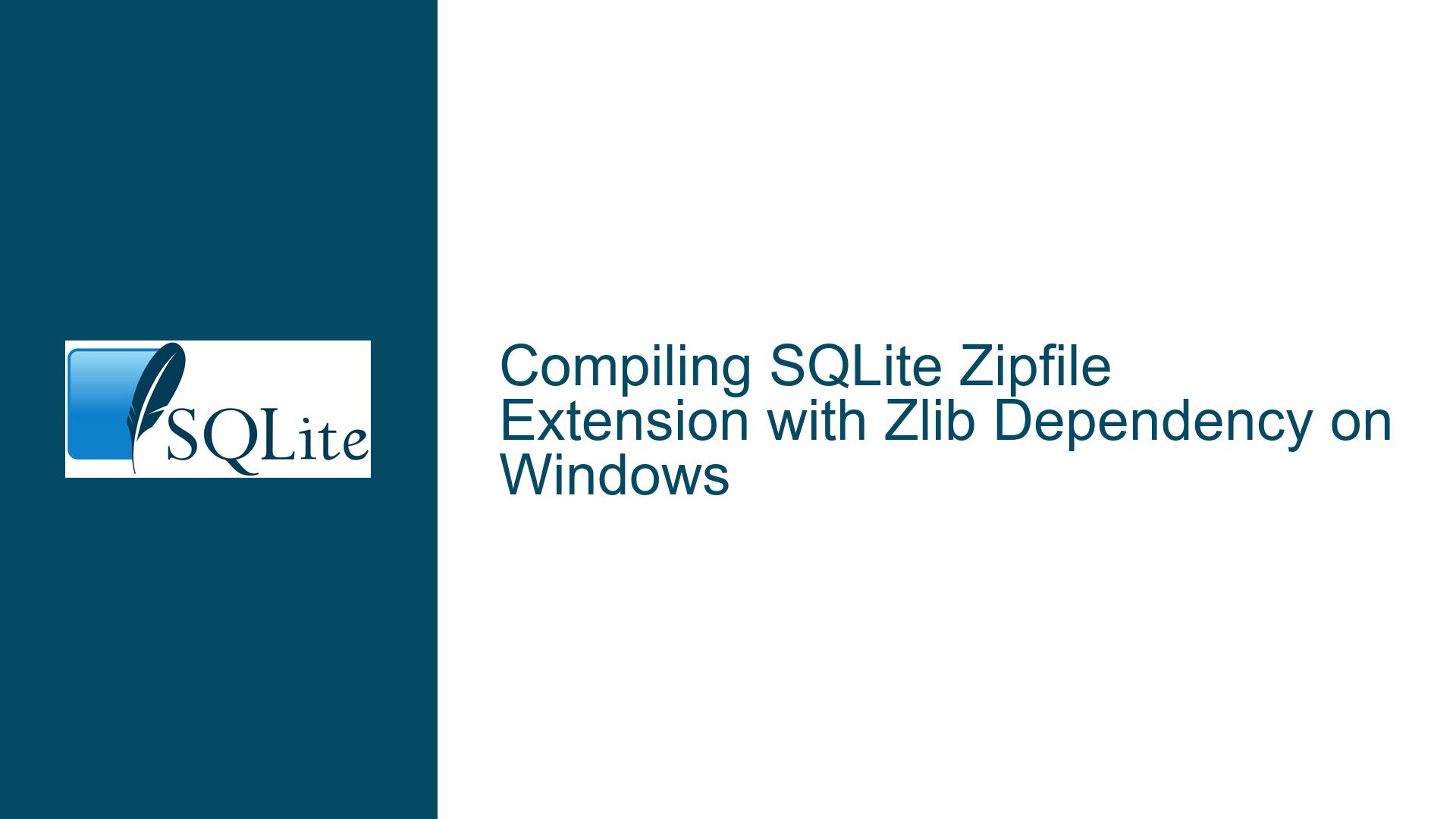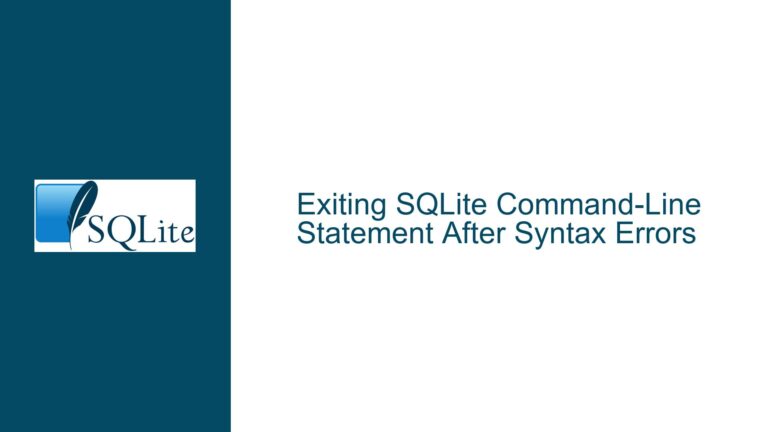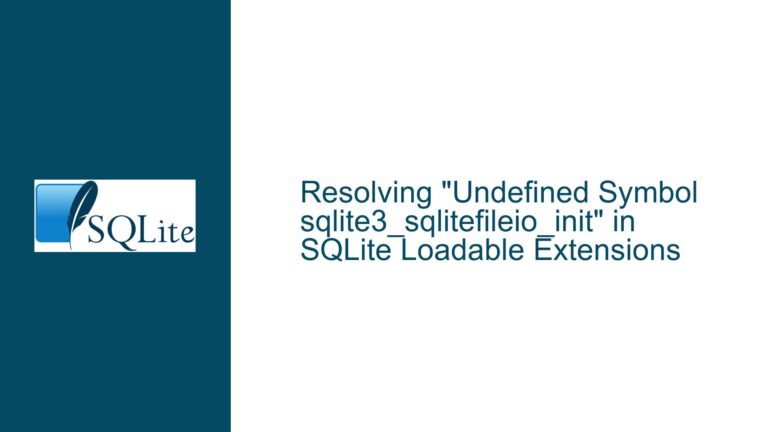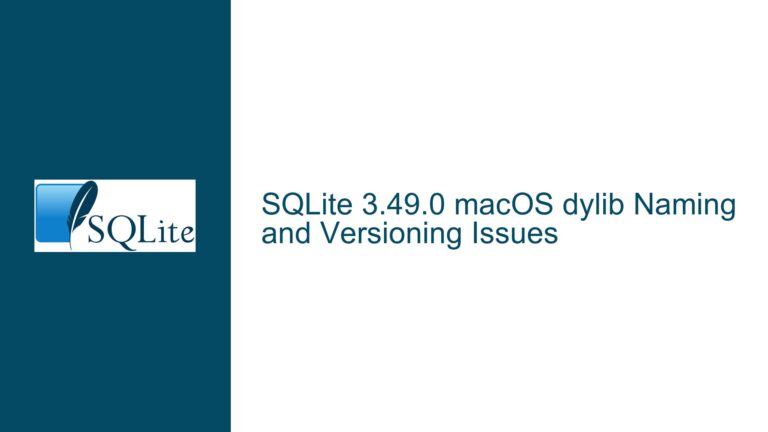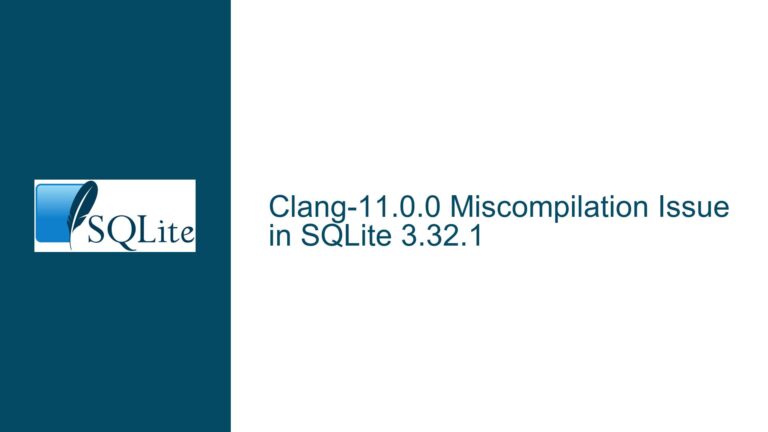Compiling SQLite Zipfile Extension with Zlib Dependency on Windows
Compiling SQLite Zipfile Extension with Zlib Dependency on Windows
The process of compiling the SQLite Zipfile extension, which relies on the Zlib library, can be challenging, especially on Windows. The Zipfile extension is a powerful tool that allows SQLite to interact with ZIP archives directly, enabling operations such as reading and writing files within a ZIP archive. However, the compilation process requires the inclusion of the Zlib library, which is not natively available on Windows. This guide will walk you through the steps necessary to successfully compile the Zipfile extension, addressing common pitfalls and providing detailed solutions.
Missing Zlib Dependency and Incorrect Compilation Commands
The primary issue when compiling the SQLite Zipfile extension on Windows is the missing Zlib dependency. The Zipfile extension relies on the Zlib library for compression and decompression operations. Without Zlib, the compilation process will fail, as the compiler will be unable to find the necessary header files and libraries. Additionally, the SQLite documentation does not explicitly mention the need to include the Zlib library during compilation, which can lead to confusion and errors.
The Zlib library is a widely used, open-source compression library that provides functions for in-memory compression and decompression. It is essential for the Zipfile extension to function correctly. When compiling the Zipfile extension, the compiler needs to know where to find the Zlib header files (zlib.h) and the corresponding library files (zlib.lib or libz.a). If these files are not correctly referenced, the compilation process will fail with errors related to missing headers or unresolved symbols.
Another common issue is the use of incorrect compilation commands. The SQLite documentation provides basic commands for compiling the Zipfile extension, but these commands do not account for the additional steps required to include the Zlib library. This oversight can lead to frustration, as users may follow the documentation precisely but still encounter compilation errors.
Downloading and Building Zlib for Windows
To resolve the issue of the missing Zlib dependency, the first step is to download and build the Zlib library. The Zlib library can be downloaded from the official website, http://zlib.net/. Once downloaded, the library needs to be unzipped to a directory on your system. The next step is to build the Zlib library from source. This process involves using a tool like CMake or a Makefile to compile the library into a format that can be linked with the Zipfile extension.
Building Zlib on Windows can be done using the MinGW or MSYS2 environment, which provides a Unix-like shell and a set of tools for compiling software on Windows. After setting up the MinGW or MSYS2 environment, navigate to the directory where Zlib was unzipped and run the appropriate build commands. For example, using the make command with the provided Makefile will compile the Zlib library and generate the necessary header and library files.
Once the Zlib library is built, the next step is to ensure that the compiler can find the Zlib header files and libraries. This can be achieved by placing the zlib.h header file in a directory that is included in the compiler’s include path, and the zlib.lib or libz.a library file in a directory that is included in the compiler’s library path. Alternatively, you can specify the paths to these files directly in the compilation command using the -I and -L flags, respectively.
Modifying Compilation Commands to Include Zlib
With the Zlib library successfully built and the necessary files in place, the next step is to modify the compilation commands to include the Zlib library. The SQLite documentation provides a basic command for compiling the Zipfile extension, but this command needs to be expanded to include the Zlib library. The modified command should include the -I flag to specify the path to the Zlib header files, the -L flag to specify the path to the Zlib library files, and the -lz flag to link the Zlib library.
For example, the following command can be used to compile the Zipfile extension on Windows using the GCC compiler:
gcc -I/path/to/zlib/include -L/path/to/zlib/lib -lz zipfile.c -o zipfile
In this command, /path/to/zlib/include should be replaced with the actual path to the directory containing the zlib.h header file, and /path/to/zlib/lib should be replaced with the actual path to the directory containing the zlib.lib or libz.a library file. The -lz flag tells the compiler to link the Zlib library, which is essential for the Zipfile extension to function correctly.
If you prefer to place the Zlib header and library files in the standard locations where the compiler looks for includes and libraries, you can simplify the compilation command. For example, if you place zlib.h in the /usr/include directory and libz.a in the /usr/lib directory, you can use the following command:
gcc -lz zipfile.c -o zipfile
This command assumes that the Zlib header and library files are in the standard locations, so there is no need to specify the include and library paths explicitly. However, this approach may not be feasible on all systems, especially on Windows, where the standard include and library paths may not be as well-defined.
Verifying the Compilation Process
After modifying the compilation commands to include the Zlib library, the next step is to verify that the compilation process completes successfully. Run the modified compilation command and check for any errors or warnings. If the compilation process completes without errors, the Zipfile extension should be successfully compiled, and you should see an executable file (e.g., zipfile.exe) in the output directory.
If the compilation process still fails, double-check the paths to the Zlib header and library files to ensure they are correct. Additionally, ensure that the Zlib library is compatible with your system and compiler. For example, if you are using a 64-bit compiler, make sure that the Zlib library is also compiled for 64-bit systems.
Testing the Zipfile Extension
Once the Zipfile extension is successfully compiled, the final step is to test it to ensure that it functions correctly. The Zipfile extension provides several functions for interacting with ZIP archives, including zipfile_open, zipfile_read, and zipfile_write. You can create a simple test program that uses these functions to open a ZIP archive, read its contents, and write new files to the archive.
For example, the following code snippet demonstrates how to use the Zipfile extension to open a ZIP archive and list its contents:
#include <sqlite3.h>
#include <stdio.h>
int main() {
sqlite3 *db;
int rc;
rc = sqlite3_open(":memory:", &db);
if (rc != SQLITE_OK) {
fprintf(stderr, "Cannot open database: %s\n", sqlite3_errmsg(db));
return 1;
}
rc = sqlite3_enable_load_extension(db, 1);
if (rc != SQLITE_OK) {
fprintf(stderr, "Cannot enable load extension: %s\n", sqlite3_errmsg(db));
return 1;
}
rc = sqlite3_load_extension(db, "zipfile", NULL, NULL);
if (rc != SQLITE_OK) {
fprintf(stderr, "Cannot load zipfile extension: %s\n", sqlite3_errmsg(db));
return 1;
}
// Use the zipfile extension to interact with ZIP archives
// ...
sqlite3_close(db);
return 0;
}
In this code snippet, the sqlite3_load_extension function is used to load the Zipfile extension into the SQLite database. Once the extension is loaded, you can use the provided functions to interact with ZIP archives. For example, you can use the zipfile_open function to open a ZIP archive, the zipfile_read function to read files from the archive, and the zipfile_write function to write new files to the archive.
Conclusion
Compiling the SQLite Zipfile extension on Windows can be a complex process, especially when dealing with the Zlib dependency. However, by following the steps outlined in this guide, you can successfully compile the Zipfile extension and use it to interact with ZIP archives in your SQLite database. The key steps include downloading and building the Zlib library, modifying the compilation commands to include the Zlib library, and verifying that the compilation process completes successfully. Once the Zipfile extension is compiled, you can test it using a simple program to ensure that it functions correctly. With these steps, you should be able to overcome the challenges of compiling the SQLite Zipfile extension on Windows and take full advantage of its capabilities.
